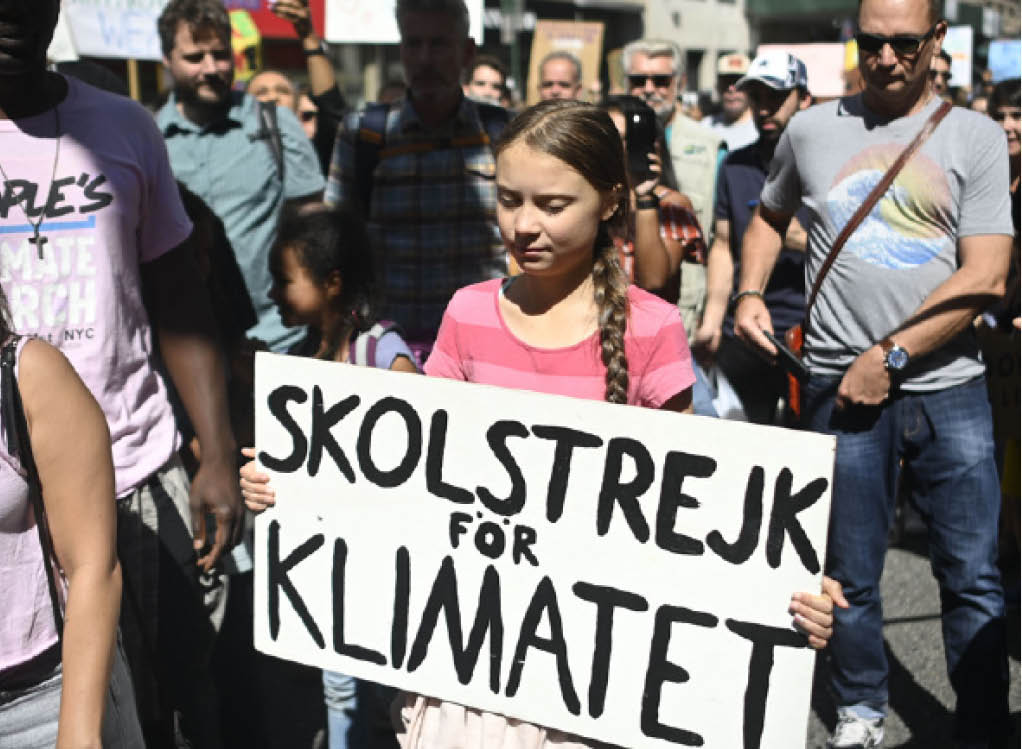Climate Strike: Day millions of voices across 185 countries were heard
Over the weekend, millions of people especially youths across the world came out en masse for a climate protest. The protest for ‘Climate Strike’ which was sparked by 16-year-old Swedish climate change activist Greta Thunberg, was described by many environmentalists and analysts as the largest mobilization in the history of the climate movement. The youths, […]

Over the weekend, millions of people especially youths across the world came out en masse for a climate protest.
The protest for ‘Climate Strike’ which was sparked by 16-year-old Swedish climate change activist Greta Thunberg, was described by many environmentalists and analysts as the largest mobilization in the history of the climate movement.
The youths, students, and pupils joined by some environmentalists, who were anxious about their future on a hotter planet and angry at world leaders for failing to arrest the crisis, hit the streets on every continent on Friday for a day of global climate protests.
They demanded urgent action to tackle global heating. They were united across time zones and cultures to take part in the biggest climate protest in history. Nigerian youths, pupils and activists also joined in the global concern about changing climate and the need for leaders to take urgent action.
The youth movement, which was started by the Swedish school striker, Thunberg, just over 12 months ago, saw people protest from the Pacific Islands, through Australia, across South East Asia and Africa into Europe and onwards to the Americas.
The protest, which took place in about 185 countries, had an overall message that was a unified, powerful demand for an urgent step to cut emissions and stabilise the climate.
The demonstrations took place on the eve of a UN climate summit, called by the Secretary-General, António Guterres, to inject urgency into government action to restrict the rise in global temperatures to 1.5C, as agreed under the 2015 Paris agreement.
In Kenya, report has it that young protesters in Nairobi wore hats and outfits made from plastic bottles to highlight the dangers of plastic waste, a major threat to people living in the developing world.
Also, the strikes took place in several Nigerian cities, including Lagos, Benin and Abuja, where youths and students lent their voices to seek climate justice. While so many hit the streets with placards that read, ‘I stand for climate justice’, ‘Friday for Future’ and ‘Our environment is in a coma, please come to her aid’, other advocates turned to the social media.
The Foundation for European Progressive Studies tweeted, “#ClimateJustice is about recognising citizens’ fundamental rights and citizens’ fundamental freedoms. “There is a lot of work to be done to move to climate finance. It is about supporting communities and entrepreneurs to contribute to climate solutions.”
An activist in the Fridays4Future campaign in Nigeria, Oladosu Adenike, on her tweeter handle said: “Climate change crisis cannot wait; it is time for us to demand climate justice.”
“Leaders should listen to what the climate scientists are saying. No leader should forfeit the future of the younger generation,” she said.
The Nigerian Conservation Foundation (NCF) also called for urgent government action on climate change, increased national climate ambition especially on carbon emission reduction, adding “There is no Planet B, we all must take action.”
An environmental justice advocate, Nnimmo Bassey, in his write up tagged ‘Climate Striking For Action’, noted that the many environmental issues going on across the globe are almost taken for granted.
He said: “Were we not all forewarned in 2018 by the Intergovernmental Panel on Climate Change (IPCC) that we have barely 12 years within which to take real climate action to avert catastrophic climate crises? What have we done to show that we understand the enormity of the dire situation?”
Countries, according to him, are still struggling to make any serious commitment to the nationally determined contributions as required by the Paris Agreement, saying, “It has long been known that the climate crisis requires holistic approaches with nations assigned amounts of emissions to cut as determined and required by sciences and according to historical and current responsibility.”
“The polar ice caps and all the ice sheets may not yet be cracking and collapsing into the sea at this time, but we have the warning that the scene is set for that to happen.
“Will nations heed the warnings we have today and take needed action? Is the world ready to leave fossil fuels in the ground and ensure a rapid transition to renewable energy sources?
“We are happy that Climate Strike has caught the attention of the world. We salute the youths for showing disgust at the slumber of adults and policymakers while the climate crisis unfolds.
“We can have conferences and mount shows to give the impression that something is being done to avert climate chaos. However, they will not stop the floods. This is no time for make-believe. This is no time for pretense. This is time to remind policy makers and polluters that the solution to the crisis is known and the time for talks is over.
“Now is the time to accept that climate change is the result of the failure of markets and the social alignments engendered by them. Now is the time for action. Keep the fossils in the ground. Halt the burning of forests, especially in the Amazon. Halt all the false solutions. Embrace renewable energy,” Bassey urged.
